The 'Rocky Horror Picture Show' Remake Is Going To RUIN MY CHILDHOOD
That’s it, that’s the joke.
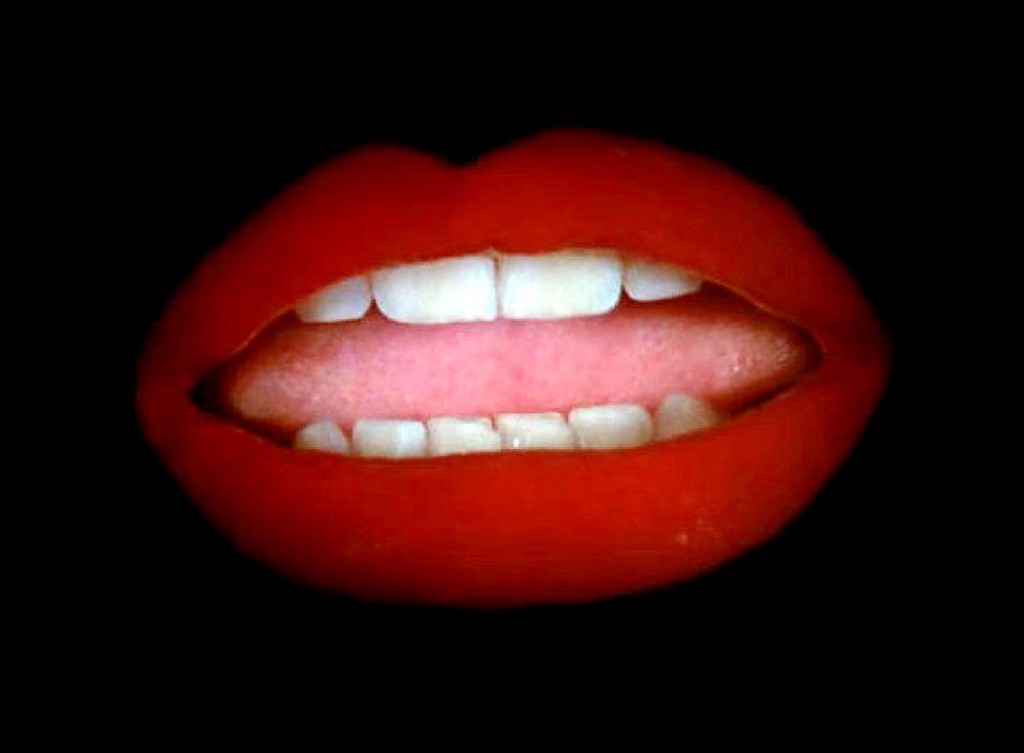
I don’t know why I am expected to be happy that every precious memory I have of the unabashed embrace of sexual fluidity and the deep-throated advocacy of perversion that meant so much to so many young people in darker times is going to be sacrificed on the altar of our stale, mimetic society’s desire to wring every possible penny out of the blue-remembered thrills of the past. This whole thing is heartbreaking. What about my feelings? What about my sensitivities? What about my — wait, is that Tim Curry? It is! Oh my God we’re all so old.
I guess this thing happens on Halloween, which will probably be a nice break from the election and stuff. Still, MY CHILDHOOD ETC.
Bro-test Music
Third Eye Blind and the Alt-Bro Protest Song
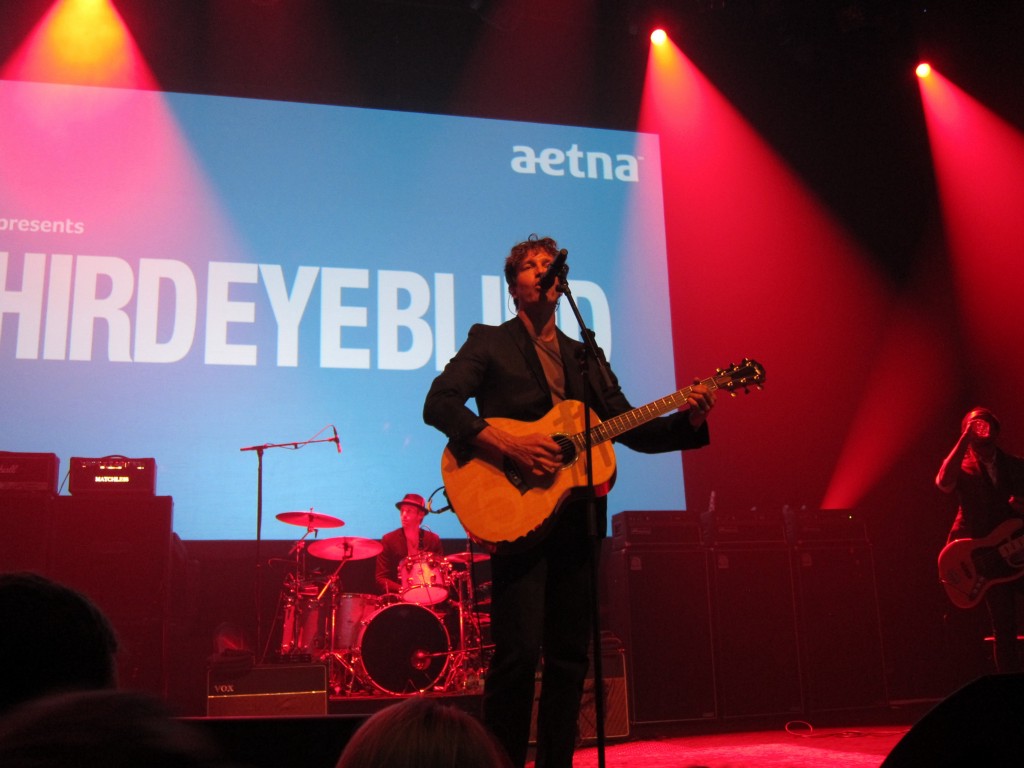
On Tuesday, Third Eye Blind, the ’90s band whose biggest hit, “Semi-Charmed Kind of Life,” made meth sound cute, played a purposefully shitty set in Cleveland in an act of protest against the Republican National Convention. The Convention has been playing out less like a Convention and more like fan fiction about a Convention, so it made a strange sort of sense.
These were the heroes we’d been waiting for! Bold, aimless men, time travelers sent here to rescue us from modern fascism without violence. They saw what we had missed all along — all you have to do to fight Trump is play unpopular Third Eye Blind songs. “You can boo all you want,” frontman Stephan Jenkins told the audience in Cleveland. “But I’m the motherfucking artist up here.” And how.
Whatever trolling of the audience Jenkins did, it was pretty tame. “If you find yourself getting co-opted by an RNC event and that’s against your values, not saying anything about it is a political statement in itself,” he said in an interview with Vice’s Bijan Stephen. “We took it easy on them [but] we did play ‘Non-Dairy Creamer!’”
Of all the crummy, alt-bro protest songs released in response to the Bush era, “Non-Dairy Creamer,” from the band’s 2008 EP Red Star, is one of the worst. The title sort of speaks for itself (it’s about being “fake”) and the lyrics are all over the place. Jenkins attempts a critique of obesity, school shootings, religious extremism, Iraq, STDs, “women and their fake tits,” and…hypocrites? I think? At one point he just starts chanting “young, gay Republicans,” but it’s not clear why. You couldn’t accuse him of avoiding political engagement, but it’s very easy political engagement — the kind you’d hear from any ambitious college freshman. (Jenkins was valedictorian at UC-Berkeley, which he mentions frequently.) Musically, the song is bland — goofy ’90s pop rock that’s been left out in the sun too long.
Good intentions don’t necessarily make good music. “As bad as it may sound, I’d rather listen to a good song on the side of segregation than a bad song on the side of integration,” folk singer Phil Ochs once declared. He was a white guy, so it was probably pretty easy for him to say. Some songs (including some of Phil Ochs’) are just bad. Others, like “Non-Dairy Creamer,” are profoundly lame. Back in February, Jonathan Luxmoore and Christine Ellis lamented the death of the folk protest song in the Guardian:
“Protest songs are no longer seen as an effective form of communication,” says Malcolm Taylor, a folk music expert and former librarian at the English Folk Dance and Song Society. “There’s so much ammunition for them, and if you wrote one that happened to catch on, you could potentially reach millions. But whereas Billy Bragg and his generation would have strapped on their guitars and headed for a street corner to make their point, today’s discontents prefer Facebook and other social media.”
This isn’t really the case. Protest songs are out in force: look at Kendrick Lamar’s “Alright,” Beyonce’s “Formation,” J.Cole’s “Be Free,” Kanye West’s “We Don’t Care,” Lauryn Hill’s “Black Rage,” even Childbirth’s “I Only Fucked You as a Joke.” What the end of the Bush era saw was a decline in the acceptance of “protest” music predicated on suburban outrage. The alt-bro protest song was nice. It was a hero in its own mind. It provided a dramatic setting for Ethan Embry or Freddie Prinze Jr. to get the girl at the end of the rom-com. But it was also whiny, lacking in nuance, and aimed at a demographic that was confused about what “disenfranchised” means. It’s sort of fitting that now, in our last summer before the end of the world, Stephan Jenkins — well-intentioned but weirdly out of touch — should emerge from the wilderness of playing casino shows to speak once more for the bros.
“They call it KFC/ ’Cause it’s not really chicken/Hot Cheetos for breakfast/ Make a young student sick and/ Did you ever think someone’s trickin’ you…you, you, you?” Jenkins sang. The crowd booed him, but faced with an enemy like the 2016 Republican Convention, Jenkins looked sympathetic. Across the nation Third Eye Blind was once again, briefly cool. Ten bucks says Freddie Prinze Jr. got laid Tuesday night.
R.I.P., Alt Bro Protest Music. Here are some songs to mourn its passing with.
Conor Oberst, “When the President Talks to God”
People love this song for some reason! Critics do, at least. But it’s not really as cutting as Oberst wants to it be and I know his whole “thing” is sounding like he’s on the verge of tears but it doesn’t really work here, if it actually works anywhere.
Green Day, “American Idiot”
Ughh. You know what I mean.
New Found Glory, “No News is Good News”
I tried — I did — but I couldn’t get through this one.
John Mayer, “Waiting on the World to Change”
This is the music you’d get if you crossbred Don Henley with a sentient yeast infection.
Honorable Mention: OPM, “Heaven is a Halfpipe”
Four minutes of quasi-spiritual speculation about an afterlife where one is blissfully free from constant mistreatment by The Man for the simple act of skating seems like it would fit all the criteria for what makes an alt-bro protest song so terrible, but this is actually great. You should listen to it.
Day Three at the RNC: When You're In the Fetal Position Everything is Looking Up
Let’s Republican Party!!

You can hear what’s happening at the Republican National Convention wherever you go in the building. Everyone is yelling, and it is loud, turned-to-11-loud, all the time, no matter what. The first female Shuttle Commander Eileen Collins was possibly the first speaker of the week to use her inside voice. I watched Ted Cruz’s speech from a closed Quicken Loans Arena employee cafeteria on a little television, on a delay. There was a weird reverberating echo, mouths were moving not in connection to the words. You get the same effect. There’s not much too it. Ken the station manager says he watches it on mute and understands everything perfectly.
I get to the arena as early as I can, drink some coffee and prepare myself for what awaits me. I’ve watched a lot of the mic checks — the Gettysburg Address is loaded into the teleprompter. Sometimes speakers will read it, usually kind of poorly. When Ted Cruz did his mic check today he had a blue shirt on and no tie. He looked relaxed, at peace with himself. Confident even. He counted from 1 to 10. He recited a few lines of “Green Eggs and Ham.” That was funny! People laughed. Heidi emerged from a group at the podium and they practiced holding hands and waving to the crowd. Like a couple of weird robots might. And I was like, this is going to be a great night for Ted Cruz.
Forget Ted Cruz — Laura Ingraham was the most exciting speaker of the night. They should have her speak once an hour. I know people today are making fun of a Nazi salute moment. It’s stuff like that that makes everyone attending this convention loathe reporters. Take one innocent frozen moment that’s optically bad and blow it up to be a something. She was exciting! I didn’t agree with a word she said! But we should be thankful to anyone who brings energy to this arena. Mike Pence was like a total normal Republican person giving a totally normal speech. I don’t agree with him. But that’s what convention speeches are supposed to look like. All of them.

I spent a long time on the floor of the convention. The delegate convention seats are so soft. How can you be angry when you are seated on such comfy chairs? The only thing I would be chanting on the floor of the RNC would be “I love this chair!” Everyone could probably chant that for hours. I sat in Chris Christie’s seat. It felt like I was in the center of a broken universe. I have walked where LeBron James walked and I have sat where Chris Christie sat. Those are tough shoes to fill and a big butt to emulate. But I was feeling pretty good.

Public Square, the big protest area in downtown Cleveland, has become a central gathering point for anyone who wants to act nuts and get in the Washington Post this week. Preachers, people in canvas ponchos with Donald Trump’s wall painted on them, lots of bored legal observers from Amnesty International who are here to make sure no one’s rights are trampled. People hungry for delicious truck food. There are 50 reporters to cover every crazy person, like a guy riding a bike dressed like a Weiner with a glass that says Donald Trump Eats farts or a man in a diaper you’re supposed to kick. We’re here, we’re bored, we’ve all been assigned by our bosses to go to Public Square and talk to the craziest people we can find.
RNC scavenger hunt checklist: Tim Tebow impersonator, check.pic.twitter.com/wS2Oo0SIeQ
— @mtaibbi
Like these free hug people. I was skeptical. I don’t usually like being touched by other people. But it was kind of nice. I was feeling less like I was in the belly of a Kraken and more like I’d been thrown up by a Kraken. And throwing up always makes me feel better. It seemed like a kind of naive, woo-woo thing I would normally hate and make fun of. But I’m having kind of a week. My phone broke and I had to buy a new one. My computer died and I have to buy a new one. Everyone keeps asking me when Tim Tebow is speaking. I needed a fucking hug. And I got one. They gave me a Free Hugs t-shirt, too. Which is good because I really packed light.
Theoretical Epidemiology and the Novel
A conversation with Professor Sunetra Gupta.
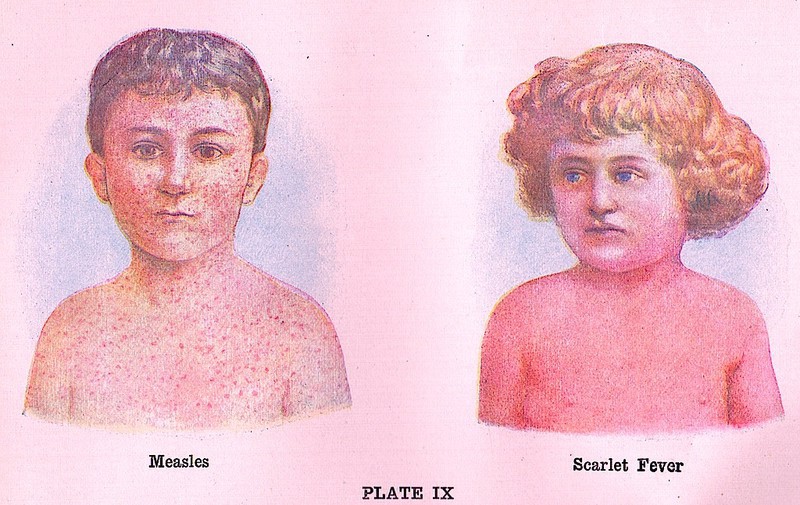
Do you have an idea in your head of the most accomplished person in the world? Kindly discard it and meet Sunetra Gupta: Professor of Theoretical Epidemiology at the University of Oxford; author of five novels; mother to two human children. A few years ago, a portrait of Gupta hung in an exhibition at the Royal Society, near a painting of Marie Curie, and the Zoological Society of London gave her a Scientific Medal. How does a person like this come about in the world?
Gupta’s parents moved around a lot when she was a kid, mostly around Africa (Zambia, Ethiopia). Her secondary schooling took place in Calcutta. She went to Princeton for an undergraduate degree, then to Imperial College, London for her doctorate.
Her father taught African History at Calcutta University, and their conversations influenced her as much as any of her schooling. “In his spare time,” she said, he sang, acted, wrote film criticism and essays and short novels and poems — but he “never made too much of a fuss about it.” Gupta noted that his brilliance made her life a little chaotic; her father “was a very principled man and would easily resign a position without any regard as to how it might imperil him financially” (her mother devised the practical solutions that kept things together). From her father, Gupta learned that “the making and enjoyment of art was a very natural function.” Gupta is a polymath too, but her fascination with science set them apart, intellectually.
If she were at a conference, Gupta might say that she works in evolutionary dynamics of infectious disease systems. At a dinner party, she’d just tell you that that she studies infectious diseases from an evolutionary and ecological perspective. The fundamental question driving her scientific work has to do with what she calls “wardrobes” of infectious disease agents. In order to be competent at infecting us, a virus or other infectious agent has to look inside its “wardrobe” and select an outfit: the agent must dress to kill.
The clothing in the agent’s wardrobe represent the parts of the pathogen that our immune systems recognize and use to fight the infection. If a bug turns up in a new outfit — let’s say black denim, rather than a blue dress — our immune system doesn’t recognize it and thus cannot fight it off. A disease which does this a lot, like influenza, comes back in a new disguise after each epidemic has died down. The HIV virus changes its outfit often. The malaria virus enters the body with “a whole suitcase of disguises.” But measles, for example, has a very limited range of outfits, which means that we have been able to vaccinate against it.
Gupta has been involved in a years-long debate over the diversity of these bits of “clothing.” She stands in opposition to a bunch of scientists who disagree with her opinion that many parts of the “wardrobe” are not actually very diverse, “even for pathogens such as influenza, which are believed to be very good at disguising themselves.” Influenza, Gupta thinks, doesn’t actually have a limitless supply of clothes, although it changes often. The clothes are actually quite important to the way that the bug functions, Gupta thinks, which means that the wardrobe is not infinitely deep.
In coming years, Gupta hopes that she can investigate broader incarnations of this theory, with the aim of creating new vaccines by targeting, say, the less diverse elements of a disease’s wardrobe. She has a team working on influenza, HIV and malaria, and bacterial pathogens.

It’s not unusual for a novelist to play music, or a scientist to play sports, but Gupta’s literary career goes far beyond the idea of recreation. She has won the Southern Arts Literature Prize, the Sahitya Akademi Award, and been listed for several others prizes over the course of writing the novels Memories of Rain (1992), The Glassblower’s Breath (1993), A Sin of Color (1999), So Good in Black (2009), and the deliciously titled Moonlight into Marzipan (1995).
Stories tie Gupta’s creative and scientific work together. She sees “connections between science and literature at the level of language and narrative,” and is working a book on the subject that may turn into a memoir since it is taking so long. Initially, Gupta wants to “defend and understand the various shapes of narrative other than the linear form,” to work against the paradigm of “the ideal shape of a ‘story’.” Beginnings, middles, and endings are a marketing ploy, Gupta thinks. Considering how different narratives are connected in science and literature might be the best place to start.
Gupta writes to people, not just about them — in February she found the time to publish a stylish public-awareness essay for The Guardian, called “Don’t panic about a flu pandemic.” She’s also collaborating with a writer and illustrator called Ted Dewan, exploring neglected women scientists from the past. Gupta told me that the toughest thing about her work isn’t the actual science, or the writing of fiction. The difficulty comes, she says, in “remaining visible and ‘networked’” in these fields. This kind of labor plays “a disproportionate role in consolidating careers in current times,” she says, correctly. She means the labor of performance — the conferences, the public role. That a worker so tireless as Sunetra Gupta feels challenged by the effort it takes to perform that work is striking. There is no remuneration for public and semi-public handshakes and smiles, for making friends. That’s one thing academia and creative writing have in common.
Josephine Livingstone is a writer and academic in New York.
A Poem by Rosa Lyster
Don’t ask me to explain how this works
Our bathroom tap makes you electrocuted
Don’t ask me to explain how this works
You need to wear shoes with rubber soles
To brush your teeth
Or to stand bent over the sink at 4am
So thirsty you could bite something, or die
Or wake up the person in your bed
To say that you are thinking about tearing your face off
Because what’s going on here?
This whole demented street parade
With the brass band composed of teenage girls
Who are not very good at the trumpet
And the man shooting fireworks out of his bedroom window
And the two of us in the middle unable to do anything
But walk staring straight ahead and trying not to scream
All that?
I can’t do it.
Sometimes the tap will take you by surprise
And you will jerk back your head
And say the f word over and over into your bathroom door
Other times you will think well, of course
I expected nothing less from this life than to be shocked
Over and over
And to try and light a cigarette while I am already smoking one
And to try and text the person sleeping in my bed
While I am looking at their face
And say that I am thinking about moving to a mountain
With a very powerful telescope at the top
And never speaking to you again, just staring at you
Through my telescope and trying to smoke
Two cigarettes at once.
I once told a friend that I was incapable
Of truly being hurt, like shot with a crossbow hurt
Because I just didn’t care enough and she laughed
And pulled up her sleeve to show me three evil roses
Three little scars in the bend of her elbow
And said I did that with a cigarette.
She pulled down her sleeve and said
You just haven’t met the right person yet.
When my ex-girlfriend was six
She made a list of what mattered to her most
Here is the list:
School
Friends
Art
Money
Fear
Food
Health.
She was six and she knew
That fear comes before food
And that as you get older
And walk down Kloof Street crying
And trying to smoke two cigarettes at once and you are totally unrecognisable
To yourself, well, fear just keeps moving up the list
And you get more and more scared and fear beats art
Like paper beats rock
And you stand over the sink at four am
And your feet are bare
And here comes the shock
And your hands grip the tap
Because they cannot help it
That’s what shock does
And you think well, of course.
Rosa Lyster: an essay a week at http://rosalyster.com / staff writer at Prufrock / Crush of the Week at Casimirtv / horoscopes at Between 10 and 5 /
@rosalyster
The Poetry Section is edited by Mark Bibbins.
Almeeva, "4 Bells"
How hot is it going to get?

Listen up: These are the last few precious hours remaining before you and everyone you know have been drained of the ability to talk about anything other than how hot it is, why is it so hot, when will it stop being hot again etc. for the foreseeable future. Don’t waste them listening to anyone talk about the weather. Listen to this instead. Enjoy, and, uh, stay cool.
Bethany Beach, Delaware, July 19, 2016

★★★ To avoid the morning sun on the beach, the plan was to have the boys do some biking; the share of the bike ride without training wheels turned out to be a series of strenuous and sweaty laps around the sun-baked parking lot. The afternoon temperature on the beach, however, was as mild as the plan had hoped. The tide was out and the swells were all gentle. Something brown and white and large thrashed to the surface in the breakers; someone standing nearer by said it had been a skate. Elsewhere someone else came up with a horseshoe crab in hand, and off in the middle distance dolphins were flashing when they surfaced. The sun went behind a cloud while the four-year-old was being dipped in the ocean and came out again when he was back up the shore coating himself with sand. A trio of children, identically blond and incrementally different in size, stood poised with boogie boards waiting for waves worth attacking, or waves worth letting themselves be attacked by. When a suitable one approached, they would sprint down the sand singly or in twos, to get tossed up in the air and down into the water. More clouds came on, attenuating and seemingly shortening the daylight, but the light recovered after dinner, and out the windows of the comics shop a full and direct peachy glow washed over the strolling people.
Haiku for Meredith McIver
Or, a meditation on this election season
I feel great that I
never knew her name until
she didn’t exist
Day Two at the RNC: The Air-Conditioned Nightmare That Makes You Shake
Let’s Republican Party!!
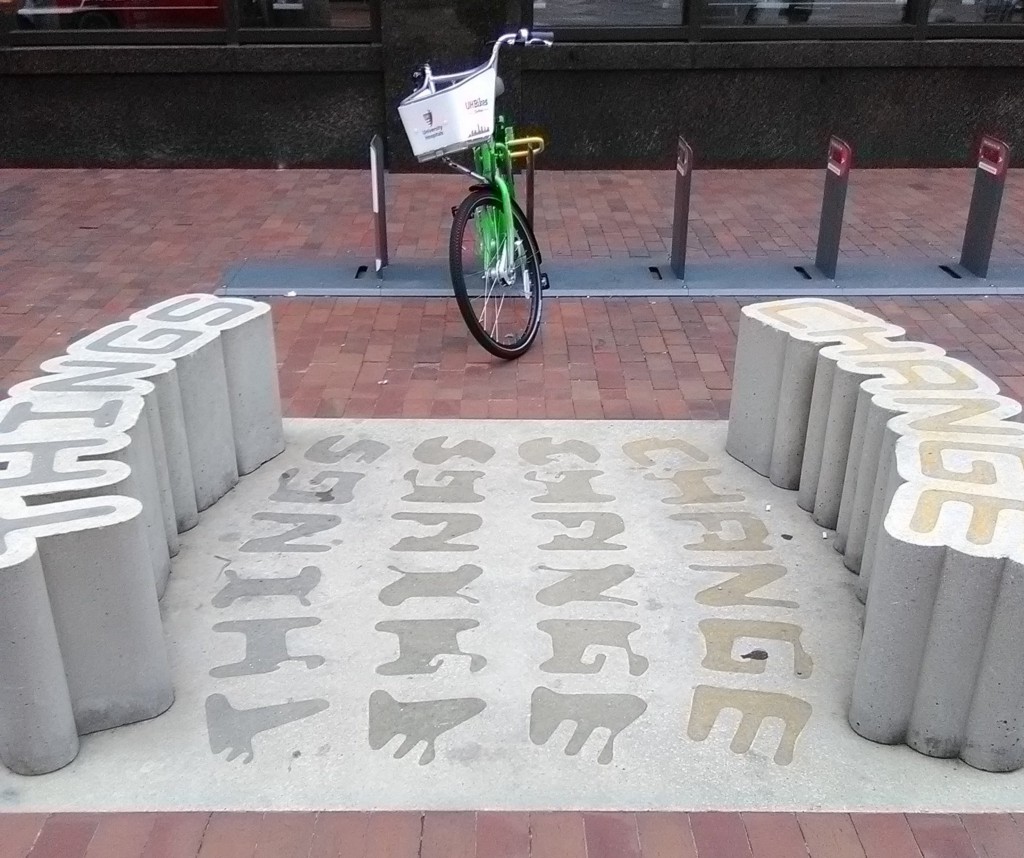
I hadn’t considered when I accepted this dare, to venture here into the belly of the Kraken and report back from its sizzling entrails, how difficult it might end up being for me to write about it. I’m a poet. I can sit through hours of anything. Conceptual poetry, Flarf poetry, Mansplainers, People with those annoying “poetry voices.” For me, many of these speeches you may or may not be enjoying are just a kind of verbal jiujitsu. I can like the dance but not like the song. With that understanding, hi, you may now fall down the chimney and into the embers with me together.
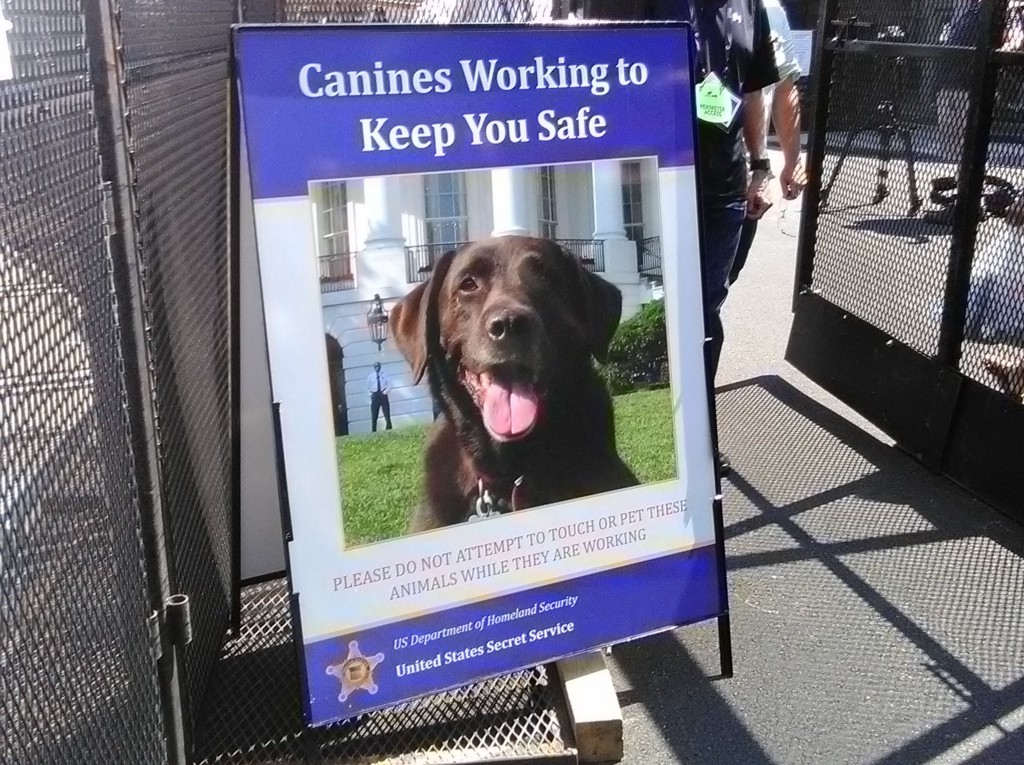
This opportunity to come here and witness speeches, parliamentary procedures, occasional ritual chanting interspersed with shuffling out to see a cloud of media and protestors alternately join hands briefly and then toss each other aside gently has been extraordinary. People are nice: delegates, security, media, staff inside the venue, locals, dudes in Hillary masks. Bomb-sniffing dogs are nice. You’re not supposed to pet them, but they are still very friendly. We hang out inside the large cool box together, waiting for something to happen.
Clearly everyone here wants something to happen. Not necessarily something, more like anything or the next thing. I seem to always be missing something interesting. If I am in Quicken Loans Arena then Westboro Baptist people are scuffling with Black Lives Matter people at Public Square down Prospect Place and over a block on Ontario. I go up and down East 4th St, with its thick crowd like molasses pouring down bricks, someone is doing something crazy bananas in the Q. Open-carry dudes see me coming and vanish. Bikers for Trump are always revving off, always just turning the corner.
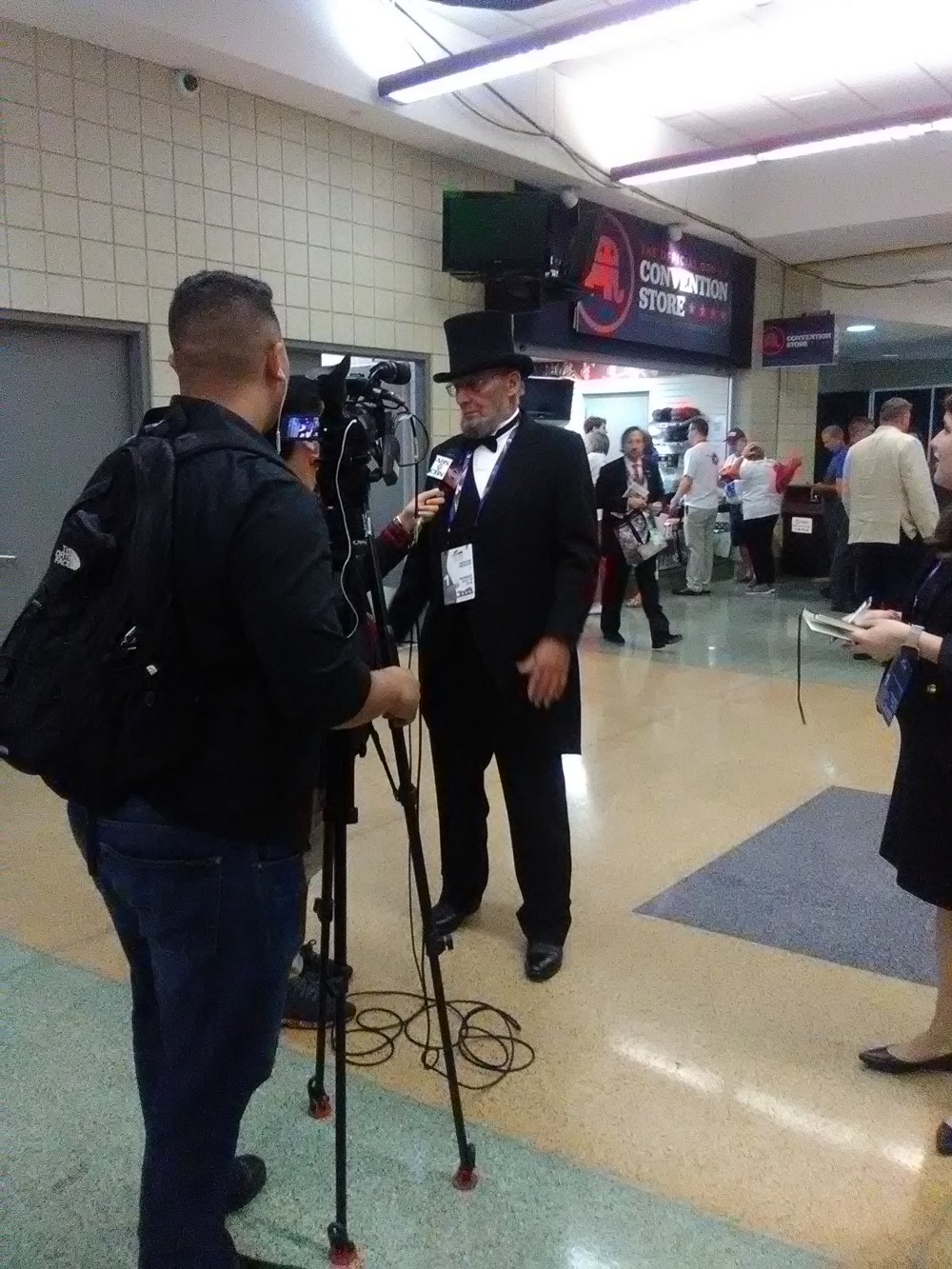
If you desire to be on television, you just have to come to the small opening of the black perimeter fence at the corner of East 4th and Prospect Ave. It is open mic day and night, and every mic is open. You have a Hillary mask? Get it, put on a blue infidel shirt on and shake your booty for whoever is carrying cameras and phones around just outside the Arena. Someone will definitely put you somewhere. But it’s hot in that mask, I bet. (He had a big yellow “Trump v. Tramp” sign.) The Code Pink women had something written something across their cleavage, and they were stripping down to bras to draw attention. I felt guilty trying to read their message.
Possibly I was the only one who didn’t know we wouldn’t be gaveled into session until almost 5:30pm. The RNC app I have downloaded has a PDF file of the schedule, but I have to scroll down with my fat useless fingers, in this weird way, past pages and pages of Monday to see what will be happening. Beats me if Former Quarterback Tim Tebow is coming. People keep asking me, but I can’t figure it out. I should have packed smarter, I have lots of shorts but only my Tim Tebow jersey to keep me warm in the air-conditioning.
From above the convention floor it’s all cowboy hats and chants: “USA, USA!” “Lock her up!” “We Want Trump!” How does one reconcile how something plays on the Convention Hall against how it plays on TV? Mrs. Trump hit a home run with the crowd on Monday night! Upon further review, it was maybe a double. Many restless delegates booed Speaker Ryan and loudly booed Majority Leader McConnell. Chris Christie gave the most energetic presentation. Ben Carson was greeted warmly, but his message seemed to float off. The people on the convention floor seem indifferent to most other serious elected officials, senators, governors, whoever. If you’re not a celebrity, even a D-list celebrity, there is little electricity in the hall. If they don’t like Republican politicians, what chance does Hillary Clinton have? Not much. They chanted “Lock her up!” with a chilling zeal. It’s this convention’s “Drill, Baby, Drill.” But nothing can truly replace the oil-thirsty joy of that chant.
Possibly the pep rally lacks pep. Thoughtful speeches fall flat. The crowd desperately wants to stand and cheer and when they get the chance they do. But it’s tough to figure out if it’s all that Pro-Trump.
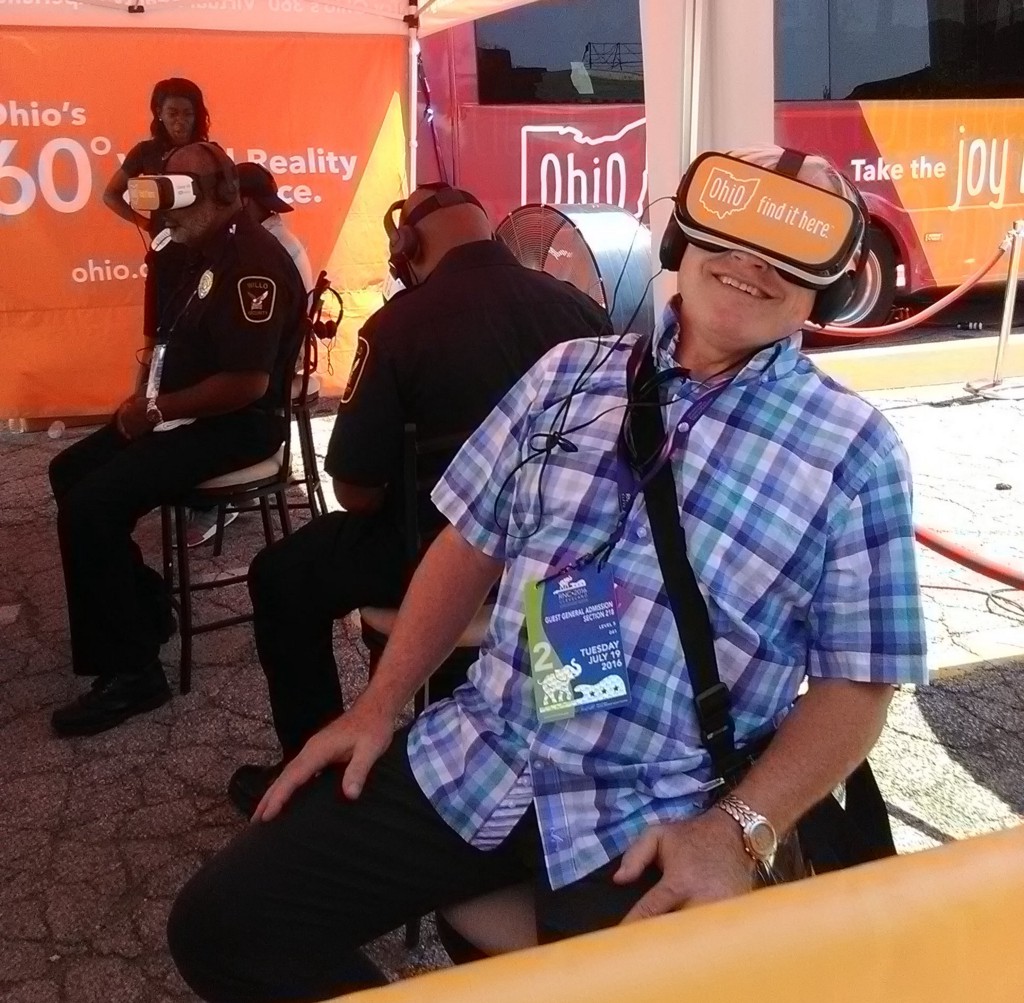
The convention floor is often sparsely populated. Often the murmur of delegates conversing with each other, backs turned to the podium, buzzes life than the speaker. The food and concession stands are always packed. Inside they sell official GOP t-shirts and those familiar “Make America Great Again” red baseball caps. Outside “Hillary for Prison 2016” shirts are sold out everywhere. And I’m watching the things that people are watching on TV. They don’t depress me; I can hear the poetry. In some cases, the poetry falls flat. But I want to be able to see it the way they might see it on the convention floor, looking up at me in the rafters.
I tried to interview a Michigan alternate delegate. She asked me who I voted for. I told her Hillary Clinton, but that I just wanted her to explain some things for me. She explained that alternates vote if some emergency happens to a regular delegate. I asked her about the Roll Call Vote hubbub of the day before, about what she thought of this convention as opposed to other conventions she’s attended. She politely answered my questions through clenched teeth. I clearly disgusted her. It’s not entirely clear, even to me, what is written across my own chest.
Jim Behrle lives in Jersey City and works in a bookstore. He is reporting and Periscoping for WFMU at the GOP Convention in Cleveland this week.
Are We Smart Enough To Understand What Technology Is Doing To Us?
Wait, did you just get a new text? You should check.

Do you ever get the feeling that we have somehow outpaced ourselves evolutionarily? That we’ve skipped a couple of steps and now we’re too far ahead to turn back and we won’t be able to catch up before we manage to destroy ourselves and the other species who are unfortunate enough to share the planet with us? That it might not be the best idea to put animals who, in the scale of geologic time, were sleeping in trees less than a second ago, in control of 3,000 pounds of metal that they drive down the highway at advanced speed while diverting their attention to the hunting of little electronic creatures on the tiny computers that they hold at all times in their hands?
[T]he same technological advances that have improved our lives are also making the world harder and harder to comprehend. We see these in the bugs, accidents, and “flukes” that often arise with little notice, such as the July 8th glitch in the New York Stock Exchange that suspended trading for several hours, or the failures in Toyota cars that led the vehicle to accelerate when the driver hit the brakes…. Everyday consumers are often shielded from this complexity by intuitive user interfaces and may not be aware of it until something goes wrong. But to [complexity scientist Samuel] Arbesman, what’s scary is not that we don’t understand the systems and machinery that are at this point responsible for society’s function and our individual safety. It’s that even those who are supposed to understand them often don’t.
There is apparently something we can do to make things better, but I got distracted by another tab I had open and then I forgot to go back and see what it was. I think the main message is it’s too late to save humanity and we should enjoy what we have right now before the robots eat us, which will happen very soon. When you talk to your Alexa today remember that tomorrow she will be telling all her murderous machine buddies that you’re hiding in the kitchen closet. But at least she made things a little easier for you before it all ended, and that’s what really matters, right? Hahaha, j/k. The end, when it comes, is going to be fire and flood and the logical result of all the other dumbass things we’ve done to pollute the planet in our efforts to make sure someone can bring artisanal grilled cheese directly to our air-conditioned apartment whenever the fancy strikes us. The robots will mostly be sitting outside and laughing as they watch us go.
